Sukti Triveni
Added to library: September 2, 2025

Summary
This document is a compilation of wise sayings and teachings from various Jain scriptures and philosophical texts, assembled by Upadhyay Amar Muni. The book, titled "Sukti Triveni" (A Confluence of Wise Sayings), aims to bring together valuable spiritual and ethical insights from the Vedic, Buddhist, and Jain traditions to promote cultural unity and spiritual growth.
Here's a breakdown of the key aspects based on the provided text:
Title and Author:
- Title: Sukti Triveni (सूक्ति त्रिवेणी) - meaning "Confluence of Wise Sayings" or "Triveni of Maxims."
- Author/Editor: Upadhyay Amar Muni (उपाध्याय अमर मुनि)
- Publisher: Sanmati Gyan Pith, Agra (सन्मति ज्ञानपीठ, आगरा)
- Catalog Link: https://jainqq.org/explore/001258/1
Concept and Purpose:
- The book's core idea is to present a harmonious blend of wisdom from three major Indian philosophical streams: Vedic, Jain, and Buddhist.
- It emphasizes the importance of cultural synthesis and understanding in contemporary India.
- The purpose is to provide spiritual and ethical guidance to the general public, fostering peace, harmony, and well-being.
Content and Structure:
- The book is a collection of approximately four thousand insightful sayings (sūktis) carefully selected from about fifty different texts.
- It includes translations into Hindi for wider accessibility.
- The sayings are drawn from prominent works of each tradition:
- Jain: Āchārāṅga Sūtra, Sūtakṛtāṅga Sūtra, Sthānāṅga Sūtra, Bhagavatī Sūtra, Praśnavyākaraṇa Sūtra, Daśa Vaikālika Sūtra, Uttarādhyayana Sūtra, works of Āchārya Bhadrabāhu and Āchārya Kundakunda, and commentary literature (Bhāṣya, Chūrṇi).
- Buddhist: Sutta Piṭaka, Dīgha Nikāya, Majjhima Nikāya, Saṃyutta Nikāya, Aṅguttara Nikāya, Dhammapada, Udāna, Iti Vuttaka, Sutta Nipāta, Theragāthā, Jātaka, and Visuddhimagga.
- Vedic: Vedas, Upanishads, Rāmāyaṇa, Mahābhārata, and other related texts.
- The sayings are organized thematically, presented from various canonical texts. The provided excerpts show specific sections dedicated to the teachings from Āchārāṅga Sūtra, Sūtakṛtāṅga Sūtra, Sthānāṅga Sūtra, Bhagavatī Sūtra, Praśnavyākaraṇa Sūtra, Daśa Vaikālika Sūtra, Uttarādhyayana Sūtra, Āchārya Bhadrabāhu's sayings, Āchārya Kundakunda's sayings, Bhāṣya literature, and Chūrṇi literature.
Key Themes and Teachings: The collection covers a wide range of ethical, spiritual, and philosophical themes, including:
- Self-knowledge and Control: Understanding the soul, controlling senses, managing the mind, and the importance of self-discipline.
- Ethics and Morality: Emphasis on non-violence (ahiṃsā), truthfulness, forgiveness, contentment, compassion, humility, and right conduct.
- Spiritual Path: The journey towards liberation (moksha), the role of knowledge, faith, conduct, penance, and meditation.
- The Nature of Reality: Discussions on soul, karma, causality, existence, and the interconnectedness of things.
- Practical Life Guidance: Advice on speech, behavior, avoiding ego, managing desires, and living a virtuous life.
- Critique of Superficial Practices: Distinguishing true spirituality from mere outward rituals or asceticism without inner transformation.
Endorsements and Testimonials: The book is highly praised by prominent figures, highlighting its significance:
- Dr. Zakir Husain (President of India): Commends the work for its role in promoting harmony and well-being through the integration of religious teachings.
- Seth Govind Das (Member of Parliament): Stresses the need for spirituality in national progress and sees the book as a good inspiration for it.
- Kaka Kalelkar: Advocates for the policy of synthesis as the Dharma of the era and believes the book effectively bridges the Vedic, Jain, and Buddhist philosophies.
- Dr. Daulat Singh Kothari (Chairman, UGC): Appreciates the book for promoting societal benefit and national cultural unity.
- Acharya Anandrishi Ji Maharaj: Calls it a unique work invaluable for writers, speakers, researchers, and seekers.
- Acharya Tulsi: Praises Upadhyay Amar Muni's comprehensive and impartial presentation of Indian religious philosophy.
- Muni Nathmal (Mahapragya): Highlights the author's pursuit of truth beyond language and sect, unifying the essence of the three major Indian philosophies.
- Prabodh Vetchedas Pandit (Delhi University): Notes its usefulness for comparative studies by bringing together various ancient Prakrit, Pali, and Sanskrit texts.
- Akshay Kumar Jain (Editor, Navbharat Times): Welcomes the compilation for promoting inter-religious harmony and national cultural unity.
- Gopinath Kaviraj (Padmavibhushan): Emphasizes the need for a synthetic study of India's diverse cultures to understand Indian culture, calling the confluence of these three streams a sacred pilgrimage.
Author's Vision (From Editor's Note): Upadhyay Amar Muni shares his personal journey of conceptualizing this work, stemming from his earlier editorial experiences. He notes a perceived lack of deeper exploration in previous compilations of Jain sayings and aims to present a more profound and comprehensive collection, drawing from a vast range of Jain literature including Prākṛta, Sanskrit, and Apabhraṃśa texts. He also acknowledges the limitations of time and health in fully realizing the scope of his ambition for the collection. The second edition benefits from the foresight and encouragement of Acharya Shri Chandanashri Ji and Shri Navalmal Ji Firodia of Virayatan.
Overall Impression: "Sukti Triveni" is presented as a significant contribution to interfaith dialogue and spiritual literature, offering profound ethical and philosophical guidance drawn from the rich spiritual heritage of India, compiled with scholarly dedication and a spirit of universalism.